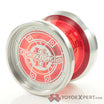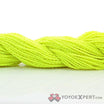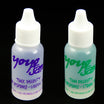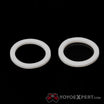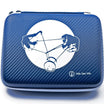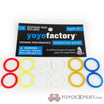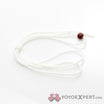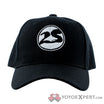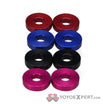I bought a shot glass from the thrift store for like 50 cents.
I use a contact lens case with a little rubbing alcohol inside. Drop the bearing in, close it up, gently jiggle it around for a bit and then pull it out and hit it with a little compressed air or just let it dry.
Not sure how the contact lens case would behave with other solvents but it’s fine with the alcohol.
Ivan
I think Gentry mentioned lighter fluid for cleaning. That seems like it would be good for dissolving any oils you don’t want in your bearing before putting the lube you want on. I wouldn’t use alcohol because there’s water in it. I’m thinking acetone, but I don’t know what’s best. The point being, that I want glass with a lid that won’t get destroyed by the chemical. My wife found these at Dollar Tree. Nice size, but the cap is lined with something that appears to be Styrofoam so I’m not sure how long that will last. For 20 cents each though, I thought it was worth trying. Too bad I don’t have any local yoyo buds to give the extras to
.
Mineral spirits is pretty benign with most plastics.
Lighter fluid works great and doesn’t affect most plastics. Have been using it for years to clean bearings as well as miscellaneous goo from sticky price labels.
Good point about alcohol having water in it. I think I’m ok because it seems to evaporate almost instantly especially with compressed air (I use 91% so it’s very high purity) but I’ll switch to something else from now on just in case.
Brake cleaner would probably do a good job, a quick blast from a spray can or spritz some into the glass jar for conventional cleaning methods. Just for fun I’m going to put some into a contact lens case and let it sit just to see how the plastic holds up.
Ivan
EDIT: I’ve got a lot of surplus contact lens cases and quite a few different solvents around the farm including C-60, turpentine and lighter fluid so if anyone wants something tested against the plastic of a contact lens case just let me know what solvent and I’ll get a soak going if I’ve got it on hand.
I have some older empty bottles from Private Reserve that are great for cleaning a lot of bearings in. The 1 oz bottles from Noodler’s and Monteverde are perfect too.
I previously used mineral spirits as it works really well to clean bearings, but takes a very long time to evaporate and proper disposal is tricky if you don’t have a chemical waste site nearby. Nowadays I use lighter fluid and it works well too.
You beat me to it. I’ve been using these for a while and haven’t had any of them fail on me yet. I mostly just use acetone and fill it up until it covers the bearing(s). Only issue with these little jars is that you have to dump the contents in order to get the bearing out but they work quite well and are totally worth the $1.00 for the lot.
If lighter fluid is hard to get ahold of for some of you younger throwers, take a look at something like GOOF OFF or Goo Gone. They will strip all of the oils and gunk off of the bearing and it works extremely well. Goo Gone is actually naptha based (lighter fluid) and Goof off is acetone based but it also has other stuff like kerosene, xylene and ethylbenzene in it. Both smell funky! but work quite well and can be found (and purchased) a lot easier than lighter fluid.
I personally just mainly use acetone. Sometimes I will use goof off if I have a bearing that’s being stubborn. I’ve never really liked mineral spirits, it never seemed to get them as clean as I want. IMO acetone is the way to go.
Both Shu and Gentry use oversized tweezers in their videos. They’d squeeze the tweezer, then put the point in the middle of the bearing and let the tweezers open up in the hole to lift it out. That was actually hard to describe in words, hopefully you’ve seen the vid or can picture it.
So just for the sake of science, I decided to test out the contact lens case plastic with different solvents. I filled each case about halfway and set them on edge to expose the lid and sealing surface to the liquid as well as the case body itself. I’ll update after a day or so, or earlier if any of the cases fail the test before then.
The shape of the case is almost perfect for bearings, as the curved interior makes it easy to slide the bearing out with a fingertip and the slight ridges inside should keep the bearing separate from any minute particles that settle to the bottom. Plus the unused side of the case could be used to store a spare bearing or extra string!
I’m testing lighter fluid (Zippo brand), turpentine, mineral spirits, CRC Brakleen and 91% isopropyl alcohol (since it was already in the contact lens case anyway).
Ivan
Search for “ointment jar” on Amazon. I’m using these with 99% IPA with no problem, not sure how they’ll stand up to acetone, but they’re cheap so probably worth a try.
Acetone will soften most plastics. Celcon/Delrin is not affected by it, but you most likely won’t find containers made from it.
Well it’s been 24 hours so I’m checking on the contact lens cases now.
I drew a line at the fluid level on each one last night, so I would know if fluid had leaked out and evaporated. None of the vessels has lost any fluid, levels are all where I left them.
I will also use a sharp pick to check for softening of the plastic.
Brakleen: The lid was extremely difficult to unscrew, it actually squeaked but I got it open without any tools. No softening is evident but the lid absolutely will not go back on. The Brakleen must have caused the plastic to swell. Brakleen = FAIL.
Zippo lighter fluid: No evidence of softening. Lid squeaked a little but I presume that’s because the thread surfaces are completely clean as it came off and back on and sealed just fine. Lighter fluid = PASS.
91% Isopropyl alcohol: Behaved similar to lighter fluid with a bit less squeak. Alcohol = PASS
Mineral Spirits: Behaved similar to lighter fluid in every way. Mineral spirits = PASS
Turpentine: Behaved similar to Isopropyl Alcohol. Turpentine = PASS
The solvents that have passed so far have had their levels re-marked and will sit and soak for another 24 hours.
Ivan
EDIT: Just found some Acetone so started a soak of that as well.
Alrighty, so I neglected to check anything over the weekend as I had more important stuff going on like sitting at the local pub. So the test chambers got an extra long soak of over four days, here are what will probably be my final results:
Zippo lighter fluid: The squeaking has gotten a little worse, and while no leakage has occurred, the lid takes some effort to get back on which indicates some swelling of the plastic. It’s not as bad as the Brakleen but annoying enough that I give Zippo fluid a FAIL.
Mineral Spirits: Again, Mineral Spirits seems to be following Lighter Fluid’s example. Same issue with slight swelling of the plastic. Mineral Spirits = FAIL
Turpentine: No issues whatsoever. Turpentine is still a PASS.
Acetone: Much to my surprise, Acetone, which I thought would be the most corrosive of the lot, shows no softening or swelling or leaking. Acetone = PASS
So the short version of the test results are that after a soak of over four days, I have determined that Acetone, 91% Isopropyl Alcohol and Turpentine can be stored in Bausch & Lomb brand generic contact lens containers with no leaking or apparent adverse effects on the plastic.
Mineral Spirits, Zippo lighter fluid and brake cleaner all cause swelling of the plastic and should not be stored in these containers.
Personally I’m probably going to stick with Acetone as it evaporates the fastest. Just need to be careful not to drip it on painted surfaces.
Ivan
To save time you could always reference a chemical resistance chart – assuming you know your chemical and your plastic type (typically labeled). No need for experimentation.
That said, I feel there are more effective methods for cleaning than submerging and shaking a bearing – even unshielded – in various hazardous solvents.
For instance, a household degreaser (Dawn dish soap), a toothbrush, and some warm running water will yield far better results. Finish with some 90% isopropyl alcohol as a drying aid and sparingly apply some thin lube. c’est magnifique!
I’m not smart enough to look at fancy word-papers, so experimentation it had to be!
And I’m too lazy to use a toothbrush with dish soap for my bearing, plus it makes the brush taste awful when I use it on my teeth later.
Much simpler to do an agitated rinse in a harsh solvent, followed by a quick blast of compressed air and a pinpoint of lube. Voila!
Ivan
EDIT: That chemical resistance chart is actually pretty interesting. For science, I checked on the contact lens case and found the letters “PP” on the bottom. Polypropylene maybe?
First, you need mechanical agitation to be most effective. For example, it’s why we brush our teeth instead of only swishing antiseptic around.
Second, some of these solvents you mentioned are really, really bad for you. I mean, using Brakleen, which contains Tetrachloroethylene – a 2A carcinogen – not worth the risk at all if you ask me.
Correct. Also, it’s #5 in the recycling triangle thingy. ![]()
Yep, the #5 was there too, inside the triangle logo thingy! It’s interesting to observe that Turpentine is rated “D” on the chemical resistance chart for Polypropylene though, which means it should have melted the plastic but my test sample is still going strong.
I’m not sure that it’s fair to compare cleaning a bearing to brushing teeth. A bearing might collect dust, dead skin flakes or tiny bits of string lint which can easily be flushed out whereas the gunk on teeth actually is a living organism that clings to the tooth material as part of it’s survival strategy, so well that it requires breaking loose by mechanical means.
And I guess maybe also because things like Brakleen or Acetone can be made far more aggressive and nasty since they don’t have to be safe to put in someone’s mouth.
But either way it seems like flushing my bearing out with Acetone or Brakleen does a dandy job at getting it clean, and to be honest I’d be worried about bending that tiny bearing cage by scrubbing with my toothbrush. So I’ll likely stick to the harsh chemicals and be responsible with my ventilation when doing so.
I’m also curious about the Turpentine, I’ll keep it soaking for a few weeks to see how long it takes before the case starts dissolving. I saw that Acetone is rated “A” so that collaborates with the results of my little test.
Ivan
